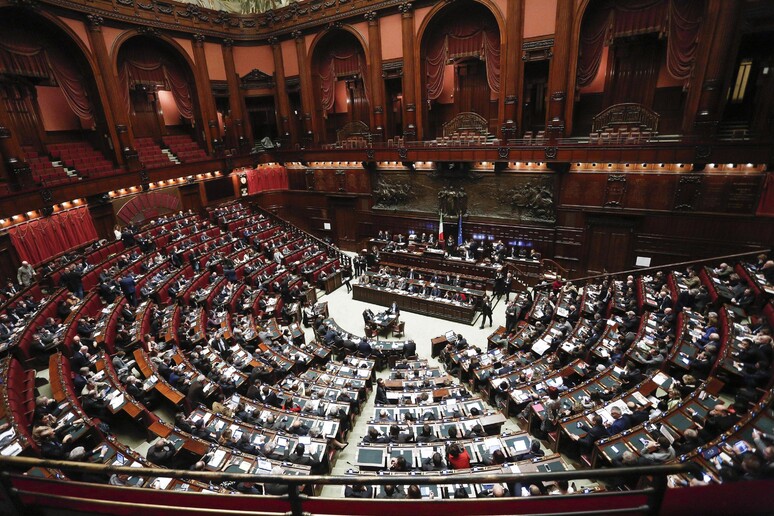The government's landmark
constitutional reform abolishing the Senate in its present form
- which Premier Matteo Renzi on Sunday called "the mother of all
battles" - returns to the Senate floor Wednesday for a third
reading.
The reform streamlining Italy's cumbersome political
machinery faces an autumn referendum to be confirmed, and the
reformist premier has said he will quit if defeated.
In a nutshell, the reform package ends so-called perfect
bicameralism, putting in place a Senate with fewer legislative
powers and made up of 95 Senators elected from regional councils
but with popular legitimacy, as well as a new federalism,
abolishing concurrent competencies between the State and
regions, and putting strategic competencies back in the hands of
the head of State.
The reform package modifies and completes the March 2001
Title V reforms, which introduced federalism.
Following, then, is an overview of the major changes set to
come about in the government as a result of the reform package
also known as the Boschi bill:
LOWER HOUSE - Will be the only body with the power to hold a
no-confidence vote. There will still be 630 MPs and they will be
elected with universal suffrage, as now.
SENATE - Will continue to be called Senate, but will be made up
of 95 members elected from regional councils (21 mayors and 74
councillor-Senators), plus five nominated for seven-year terms
by the head of state. Will have full legislative powers only on
constitutional laws and reforms. Regarding ordinary laws, can
ask the Lower House for modifications, but the Lower House is
not required to carry out the requests. If the Senate asks the
Lower House to modify a law that regards the relationship
between the state government and regional governments, the Lower
House must have an absolute majority in order to refute the
request.
POPULAR LEGITIMACY - A new addition to the Senate, by request of
the Democratic Party (PD) minority. Voters, at the time of
electing their regional councillors, will also indicate which of
those they also wish to elect as Senators. The regional
councils, once seated, will be required to ratify the choice.
SENATOR-COUNCILLORS: The 95 Senators will be partitioned out
between the regions based on each region's demographic weight.
The regional councils will elect Senators from within their
councils using a proportional method, and one senator from each
region must also be a mayor.
IMMUNITY: The new Senators will have the same immunity
protections as the MPs, namely that they can't be arrested or
subject to wiretaps without Senate authorisation.
FEDERALISM: Certain competencies have been returned to the hands
of the head of government, such as energy, strategic
infrastructure, and the national system of civil protection.
Also, through a government proposal, the Lower House will be
able to approve laws that are within the competence of the
regional councils, "when required in order to safeguard the
judicial or economic unity of the Republic, that is, to
safeguard national interests".
VOTE ON SPECIFIC DATE: Parliamentary regulations must indicate a
specific time for voting on government bills, and limits to the
government will be introduced on contents of bills.
PRESIDENT OF THE REPUBLIC: Will be elected by the 630 MPs and
the 100 Senators. For the first three ballots a two-thirds
majority will be required; from the fourth ballot,
three-fourths; from the seventh ballot a three-fifths majority
will suffice. At present the quorum is lower, with an absolute
majority from the fourth ballot on.
CONSTITUTIONAL COURT: Of the 15 constitutional judges, three
will be elected by the Lower House and two by the Senate.
REFERENDUM: A lower quorum will be required on referendums for
which 800,000 signatures are collected rather than 500,000: to
make it valid will require approval by half of those who voted
in the most recent elections, rather than half of all registered
voters.
POPULAR INITIATIVE BILLS: The number of signatures required to
propose a popular initiative rises from 50,000 to 150,000.
However, Lower House rules must indicate precise times of
examination, a clause which doesn't currently exist.
ELECTORAL LAW - A preventative appeal to the Constitutional
Court on electoral laws can be made by request of one-fourth of
the members of the Lower House. Among the transitional
regulations is also the possibility of a preventative appeal
during the current legislature. Therefore even the Italicum
electoral reform bill could come under examination of the
Constitutional Court.
PROVINCES - Will be abolished from the constitution, a necessary
step in order to definitively abolish them.
CNEL - The National Council on Economy and Labour (CNEL), a
constitutional organ based on the 1948 Charter, will be
abrogated.
ALL RIGHTS RESERVED © Copyright ANSA











